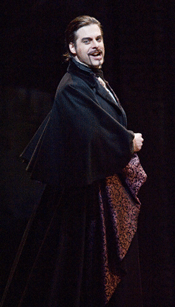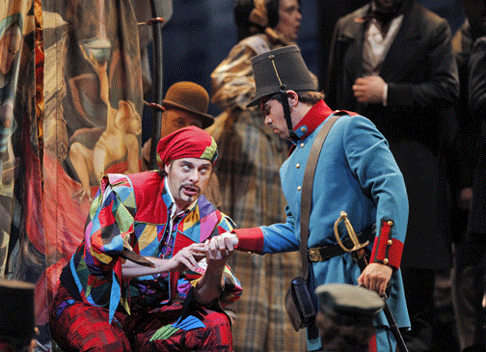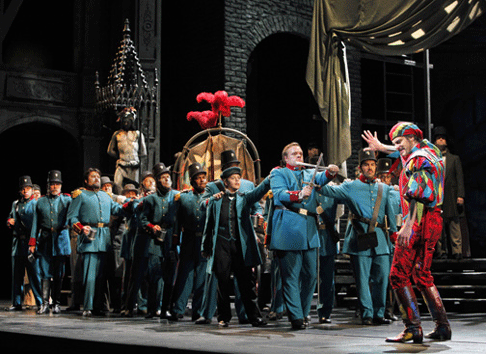![Patricia Racette (Marguerite) and Sefano Secco (Faust) [Photo by Cory Weaver courtesy of San Francisco Opera]](http://www.operatoday.com/RacSec_CW.gif)
08 Jun 2010
Faust in San Francisco
Faust has long since left the French repertory to enter the international repertory, meaning that, like Disneyland, it has been absorbed into diverse cultures where it discovers new resonances.
English Touring Opera are delighted to announce a season of lyric monodramas to tour nationally from October to December. The season features music for solo singer and piano by Argento, Britten, Tippett and Shostakovich with a bold and inventive approach to making opera during social distancing.
This tenth of ten Live from London concerts was in fact a recorded live performance from California. It was no less enjoyable for that, and it was also uplifting to learn that this wasn’t in fact the ‘last’ LfL event that we will be able to enjoy, courtesy of VOCES8 and their fellow vocal ensembles (more below …).
Ever since Wigmore Hall announced their superb series of autumn concerts, all streamed live and available free of charge, I’d been looking forward to this song recital by Ian Bostridge and Imogen Cooper.
The Sixteen continues its exploration of Henry Purcell’s Welcome Songs for Charles II. As with Robert King’s pioneering Purcell series begun over thirty years ago for Hyperion, Harry Christophers is recording two Welcome Songs per disc.
Although Stile Antico’s programme article for their Live from London recital introduced their selection from the many treasures of the English Renaissance in the context of the theological debates and upheavals of the Tudor and Elizabethan years, their performance was more evocative of private chamber music than of public liturgy.
In February this year, Albanian soprano Ermonela Jaho made a highly lauded debut recital at Wigmore Hall - a concert which both celebrated Opera Rara’s 50th anniversary and honoured the career of the Italian soprano Rosina Storchio (1872-1945), the star of verismo who created the title roles in Leoncavallo’s La bohème and Zazà, Mascagni’s Lodoletta and Puccini’s Madama Butterfly.
Evidently, face masks don’t stifle appreciative “Bravo!”s. And, reducing audience numbers doesn’t lower the volume of such acclamations. For, the audience at Wigmore Hall gave soprano Elizabeth Llewellyn and pianist Simon Lepper a greatly deserved warm reception and hearty response following this lunchtime recital of late-Romantic song.
Collapsology. Or, perhaps we should use the French word ‘Collapsologie’ because this is a transdisciplinary idea pretty much advocated by a series of French theorists - and apparently, mostly French theorists. It in essence focuses on the imminent collapse of modern society and all its layers - a series of escalating crises on a global scale: environmental, economic, geopolitical, governmental; the list is extensive.
For this week’s Live from London vocal recital we moved from the home of VOCES8, St Anne and St Agnes in the City of London, to Kings Place, where The Sixteen - who have been associate artists at the venue for some time - presented a programme of music and words bound together by the theme of ‘reflection’.
'Such is your divine Disposation that both you excellently understand, and royally entertaine the Exercise of Musicke.’
Amongst an avalanche of new Mahler recordings appearing at the moment (Das Lied von der Erde seems to be the most favoured, with three) this 1991 Mahler Second from the 2nd Kassel MahlerFest is one of the more interesting releases.
‘And there was war in heaven: Michael and his angels fought against the dragon; and the dragon fought and his angels, And prevailed not; neither was their place found any more in heaven … that old serpent … Satan, which deceiveth the whole world: he was cast out into the earth, and his angels were cast out with him.’
If there is one myth, it seems believed by some people today, that probably needs shattering it is that post-war recordings or performances of Wagner operas were always of exceptional quality. This 1949 Hamburg Tristan und Isolde is one of those recordings - though quite who is to blame for its many problems takes quite some unearthing.
There was never any doubt that the fifth of the twelve Met Stars Live in Concert broadcasts was going to be a palpably intense and vivid event, as well as a musically stunning and theatrically enervating experience.
‘Love’ was the theme for this Live from London performance by Apollo5. Given the complexity and diversity of that human emotion, and Apollo5’s reputation for versatility and diverse repertoire, ranging from Renaissance choral music to jazz, from contemporary classical works to popular song, it was no surprise that their programme spanned 500 years and several musical styles.
The Academy of St Martin in the Fields have titled their autumn series of eight concerts - which are taking place at 5pm and 7.30pm on two Saturdays each month at their home venue in Trafalgar Square, and being filmed for streaming the following Thursday - ‘re:connect’.
The London Symphony Orchestra opened their Autumn 2020 season with a homage to Oliver Knussen, who died at the age of 66 in July 2018. The programme traced a national musical lineage through the twentieth century, from Britten to Knussen, on to Mark-Anthony Turnage, and entwining the LSO and Rattle too.
With the Live from London digital vocal festival entering the second half of the series, the festival’s host, VOCES8, returned to their home at St Annes and St Agnes in the City of London to present a sequence of ‘Choral Dances’ - vocal music inspired by dance, embracing diverse genres from the Renaissance madrigal to swing jazz.
Just a few unison string wriggles from the opening of Mozart’s overture to Le nozze di Figaro are enough to make any opera-lover perch on the edge of their seat, in excited anticipation of the drama in music to come, so there could be no other curtain-raiser for this Gala Concert at the Royal Opera House, the latest instalment from ‘their House’ to ‘our houses’.
"Before the ending of the day, creator of all things, we pray that, with your accustomed mercy, you may watch over us."
![Patricia Racette (Marguerite) and Sefano Secco (Faust) [Photo by Cory Weaver courtesy of San Francisco Opera]](http://www.operatoday.com/RacSec_CW.gif)
Faust has long since left the French repertory to enter the international repertory, meaning that, like Disneyland, it has been absorbed into diverse cultures where it discovers new resonances.
The operatic culture at San Francisco Opera is quite Italian these days, explaining maybe why for this montage of Gounod’s 1859 masterpiece the baton was passed to Italian conductor Maurizio Benini and its leading role was entrusted to fine Italian tenor Stefano Secco.
We might have been tempted to think of it as an Italianate montage except that all but one of the rest of its cast were graduates of SFO’s estimable young artist stable, the Adler Fellows, most notably the divissima Patricia Racette as a touching Marguerite, and not too far behind John Relyea as an ultra debonair Méphistophélès. Not to mention soprano Daniela Mack as a right-on Siébel.
 John Relyea as Méphistophélès [Photo by Terrence McCarthy courtesy of San Francisco Opera]
John Relyea as Méphistophélès [Photo by Terrence McCarthy courtesy of San Francisco Opera]
The Adler Fellows is the justifiable pride of San Francisco Opera. Young singers arrive and are transformed into young artists many of whom eventually or even quickly become big stars with extraordinary dimension — well schooled fine voices and well schooled stage comportment. If you were a stage director these artists could be the colleagues of your dreams.
The production (sets and costumes) for this Faust montage came from the San Francisco Opera warehouse where it has been sequestered for fifteen years. The program booklet did not identify an original director, though the scenery and costumes were attributed to Robert Perdziola a veteran of several SFO productions during the Mansouri years. It was a meant-to-be dreary, towering unit set, its painted backdrop even more dreary architecture, scenery reminiscent of all the mistaken reasons Faust is considered a dated old piece that does not resonate with current sensibilities.
Staging of this revival was entrusted to yet another former Adler Fellow (the Adler Fellows occasionally include the odd stage director as well as the usual singers). Argentine born and trained Jose Maria Condemi did his best to make something of all this — like making Faust who we always thought was a philosopher into an anatomy professor. The opera began with four corpses on the stage awaiting dissection, Faust about to become a fifth corpse. But suddenly one of the corpses arose as Méphistophélès who saved the day.
Wagner, current Adler Fellow Austin Kness, was not a student but a soldier, later brought back from battle on a stretcher where, wept upon by his mother, he expired during the rousingly famous Soldiers’ Chorus, meanwhile Valentin, Juilliard trained Brian Mulligan as commanding officer presented flags to distraught wives and mothers of the soldiers who did not return.
 John Relyea as Méphistophélès and Austin Kness as Wagner [Photo by Cory Weaver courtesy of San Francisco Opera]
John Relyea as Méphistophélès and Austin Kness as Wagner [Photo by Cory Weaver courtesy of San Francisco Opera]
And, uhm, Méphistophélès arrived at the fair (Kermesse) like Pagliacci (in harlequin garb) in his pornography wagon, Marguerite sang her spinning song while operating a huge loom in an eighteenth or some other century sweatshop. Just when you thought Faust was about pretty music it turned out to be about stage business. Mr. Condemi did indeed have many ideas that the singers worked too hard to implement. We soon tired of all those ideas and from all that work and just wanted to hear Gounod’s beautiful music.
But that we did not. Conductor Benini took turgid tempos, confusing Faust’s inherently pretty sentimentalism with hard-hitting verismo. Tenor Stefano Secco, a sensitive actor, did have some very fine moments of quite beautiful singing, never quite suppressing a hint of squillo or the sense that a tenorial sob was out of the question. Mr. Mulligan, the Valentin, quickly created his character in his Avant de quitter as an insensitive, volatile, big voiced personality who had not quite mastered the strut and lurch school of acting. Mme. Racette indulged us with some thrilling diva singing though her persona conveyed heroic distress more than Marguerite’s innocent madness.
The Saturday night audience, the opening night of the spring season, was out for a good time and judging from the applause Méphistophélès succeeded best in making it fun. Bass Baritone John Relyea dominated the stage with a commanding presence, a forceful voice, and lots of colorful costumes. The staging however deprived him of all possibility to exploit the sometimes diabolically sublime music Gounod gave him, in particular his here sarcastic delivery of the meltingly beautiful invocation to darkness Ô nuit, étends sur eux ton ombre.
 Brian Mulligan as Valentin and John Relyea as Méphistophélès [Photo by Cory Weaver courtesy of San Francisco Opera]
Brian Mulligan as Valentin and John Relyea as Méphistophélès [Photo by Cory Weaver courtesy of San Francisco Opera]
The name of the opera is Faust though it is all about Marguerite who has the great showpiece arias plus the sometimes spine-tingling ascension. But Faust gets the last bow anyway. Though his cad-like behavior on stage had not endeared him to the audience Mr. Secco gracefully accepted his less enthusiastic ovation, knowing that he had made a successful debut in a role that will serve him well in international circles.
Lighting designer Duane Schuler did not take an opening night bow. Mr. Schuler most recently lighted the Peter Stein Tchaikowsky trilogy in Lyon, moving from the sublime to the ridiculous.
Michael Milenski